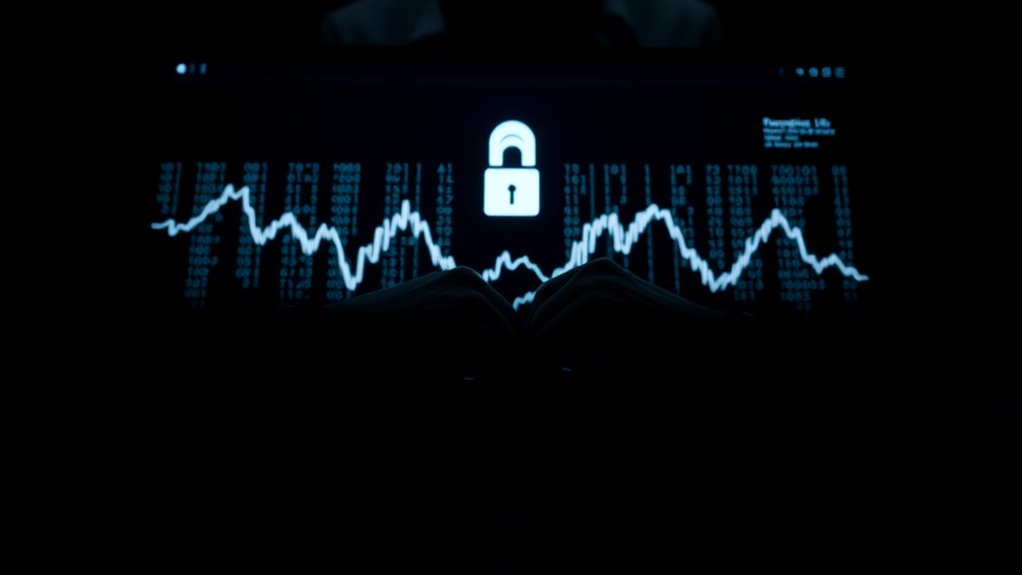
Bitcoin Security and Risks: What Are the Threats to Your Investments?
Bitcoin investments face multiple security threats despite decentralization advantages. Key risks include exchange vulnerabilities, private key compromise, smart contract exploits, and market volatility. Hackers increasingly target cryptocurrency holdings through phishing attacks and exchange breaches. Regulatory uncertainty adds another layer of complexity. Effective protection requires hardware wallets, multi-factor authentication, diversification, and regular security updates. Understanding these threats and implementing proper security protocols can greatly reduce potential losses to your digital assets.
Key Takeaways
- Private key compromise is a critical risk, with incidents surging 1,171% from Q1 2023 to Q1 2024.
- Exchange vulnerabilities expose investors to hacking risks, as centralized platforms create single points of failure.
- Smart contract exploits have led to substantial financial losses, like Poly Network's $600 million breach in 2021.
- Market volatility presents significant investment risk, with Bitcoin experiencing extreme price fluctuations during market cycles.
- Regulatory uncertainty creates compliance challenges and potential asset seizure risks across different jurisdictions.
The Double-Edged Sword of Decentralization

While Bitcoin's decentralized architecture represents one of its most celebrated features, this fundamental characteristic presents both significant advantages and notable vulnerabilities. The absence of central authority creates resilience against censorship and single-point failures, while fostering diverse participation that enhances network security.
However, decentralization introduces substantial challenges. Without standardized security protocols, networks become more susceptible to various attack vectors. The high energy consumption required for mining operations raises environmental sustainability concerns.
Decentralization's freedom comes at a cost: increased vulnerability and significant environmental impact from energy-intensive operations.
Additionally, despite theoretical decentralization, practical implementation has led to concentration risks, particularly in mining hardware production and operation. When supply chains or manufacturing becomes dominated by single entities or countries, the network's true decentralization is compromised.
These centralization points create vulnerabilities that could potentially undermine Bitcoin's foundational security model. Developing regulatory frameworks that protect consumers without stifling innovation remains crucial for sustainable growth in the crypto market.
Understanding Smart Contract Vulnerabilities

Although Bitcoin itself does not support complex smart contracts like Ethereum and other blockchain platforms, understanding smart contract vulnerabilities remains vital for cryptocurrency investors and developers.
These self-executing contracts become immutable once deployed, making flawless code essential.
Common vulnerabilities include reentrancy attacks, where functions are called recursively, and integer overflow issues that cause miscalculations. Financial losses from these exploits have been substantial, with Poly Network losing over $600 million in 2021.
DeFi platforms are particularly vulnerable to flash loan attacks and oracle manipulations.
To mitigate risks, developers implement rigorous code audits, secure development practices, and formal verification methods.
Regular testing in controlled environments before deployment is vital. These preventative measures help maintain trust in blockchain technology while reducing the potential for devastating financial and reputational damage.
Cybersecurity Threats to Bitcoin Holders

Bitcoin holders face multiple cybersecurity threats, with cryptocurrency exchanges representing a significant vulnerability due to inadequate security measures and notable breaches exceeding $500 million.
Users must remain vigilant against phishing attacks, which commonly trick individuals into revealing private keys through deceptive emails or fraudulent websites.
Proper private key management is essential, as these digital credentials require secure storage methods like hardware wallets to prevent unauthorized access.
Lost or stolen keys potentially result in permanent loss of Bitcoin assets.
Implementing two-factor authentication provides an additional layer of security that significantly reduces the risk of unauthorized access to cryptocurrency accounts and wallets.
Exchange Vulnerability Issues
Numerous cryptocurrency exchanges face persistent cybersecurity threats that endanger Bitcoin holders' assets on a global scale.
Centralized exchanges often present single-point vulnerabilities that hackers exploit through various means, including API key theft and software weaknesses.
Major incidents like the Coincheck breach, which resulted in $500 million in losses, demonstrate the severity of these threats.
These vulnerabilities emerge partly due to inconsistent regulatory standards worldwide, with many exchanges operating without regular security audits.
When breaches occur, the consequences extend beyond immediate financial losses to include market volatility, erosion of user trust, and increased regulatory scrutiny.
State-sponsored actors, including North Korean hackers, have been implicated in sophisticated attacks, highlighting the geopolitical dimensions of cryptocurrency security threats.
The level of protection available to exchange users varies significantly based on regulatory frameworks in different jurisdictions, with some countries offering robust consumer protections while others leave investors with limited recourse after security incidents.
Phishing Attack Prevention
Beyond the security challenges facing exchanges, individual Bitcoin holders confront a more personal threat: phishing attacks that specifically target their digital assets. These attacks come in various forms, including spear phishing, clone phishing, and social engineering tactics that trick users into revealing private keys or wallet credentials.
Protecting against these threats requires implementing several key security practices. Users should enable two-factor authentication on all accounts, verify email sources before clicking links, and use strong, unique passwords.
Hardware wallets provide additional security by keeping private keys offline. When accessing cryptocurrency platforms, always use official channels and be wary of suspicious offers promising unrealistic returns.
Regular software updates and security-focused browser extensions can further enhance protection against increasingly sophisticated phishing attempts. Implementing multi-signature protection can add an essential layer of security by requiring multiple approvals for transactions. Remaining educated about emerging threats is ultimately the best defense.
Private Key Management
The cornerstone of Bitcoin security lies in effective private key management, a critical aspect that determines whether digital assets remain protected or vulnerable to theft.
Private key compromises have surged by 1,171% from Q1 2023 to Q1 2024, resulting in considerable financial losses, including $239 million in early 2024 alone.
Hardware wallets like Ledger and Trezor offer robust solutions by storing private keys offline, greatly reducing vulnerability to cyber attacks. Keys never leave these devices during transactions, creating a secure barrier against unauthorized access.
Unlike common misconception, cryptocurrency wallets don't actually store coins but rather secure the private keys necessary for accessing and authorizing transactions with your digital assets.
For ideal protection, Bitcoin holders should:
- Never store private keys on vulnerable devices like personal computers
- Implement regular backup strategies with duplicate wallets in secure locations
- Seek professional guidance from cybersecurity experts to enhance security measures
Market Volatility and Investment Considerations

While many cryptocurrencies experience price fluctuations, Bitcoin stands out for its remarkable volatility, which presents both opportunities and considerable risks to investors. Historical data shows that Bitcoin can experience extreme price swings, sometimes exceeding 100% within short periods, as witnessed in November 2022. These dramatic movements have been documented throughout Bitcoin's price journey history, including significant bull and bear market cycles that have defined its development. Investors often overestimate Bitcoin's volatility, with implied volatility typically higher than realized volatility. This high-risk, high-reward nature requires careful consideration of diversification strategies to mitigate potential losses. Global events, including the COVID-19 pandemic, economic policies, and geopolitical tensions, considerably influence Bitcoin's price stability. Additionally, regulatory uncertainty and potential market manipulation by large-scale investors further contribute to unpredictability. As Bitcoin approaches mainstream adoption, investors should remain aware that its current speculative nature continues to pose substantial investment risks.
Private Key Management: Your First Line of Defense

Private keys represent the cornerstone of Bitcoin security, serving as the digital signature that grants access to cryptocurrency holdings on the blockchain. These secret numbers must be protected at all costs, as their exposure could result in permanent loss of funds with no recovery options.
Storage methods vary considerably in security levels:
- Hardware wallets provide offline "cold storage," offering superior protection against online threats.
- Software and mobile wallets offer convenience but increase vulnerability to malware.
- Paper wallets and seed phrases require secure physical storage to prevent theft.
Best practices include keeping backups, using strong encryption, and considering multi-signature wallets that require multiple approvals for transactions.
As threats evolve, including potential risks from quantum computing, staying informed about secure key management remains essential.
Finding the right balance between convenience and security is critical when choosing the appropriate Bitcoin wallet for your specific needs and holdings.
Exchange Security and Third-Party Risks

Cryptocurrency exchanges present significant security challenges, with platforms like Coincheck suffering losses exceeding $550 million due to inadequate security measures.
When users entrust their Bitcoin to third-party custodians such as exchanges, they expose themselves to risks including hacking incidents, DDoS attacks, and operational vulnerabilities beyond their control.
These third-party security concerns extend to wallet integrations, API vulnerabilities, and partnership risks that can compromise user funds even when personal security practices are strong.
Understanding the difference between centralized vs decentralized exchanges is crucial for evaluating the security profile and potential vulnerabilities of platforms where you store your digital assets.
Exchange Breach Vulnerabilities
Exchange platforms represent the most vulnerable link in the Bitcoin ecosystem, with billions of dollars lost to hackers in recent years.
The 2014 Mt. Gox attack resulted in 850,000 stolen Bitcoins, valued at over $7 billion today, while more recent breaches like DMM Bitcoin (2024) and BitMart (2021) saw losses of $305 million and $196 million respectively.
These vulnerabilities typically stem from:
- Inadequate security protocols and insufficient auditing practices
- Private key compromises and smart contract flaws
- Sophisticated attack methods including DDoS attacks, phishing, and malware
Nation-state actors, particularly North Korean-affiliated groups like Lazarus, have become prominent threats.
Their advanced tactics exploit exchanges with limited regulatory oversight, continuously evolving to circumvent security measures while funding illicit operations through stolen cryptocurrency.
Beginners should prioritize exchanges with robust security measures when selecting a platform to minimize their exposure to these persistent threats.
Third-Party Custody Concerns
The majority of Bitcoin users relying on third-party custody services face significant risks beyond the immediate threats of exchange hacks. When investors surrender control of their private keys to custodians, they expose themselves to counterparty, bankruptcy, and regulatory risks. Using reliable tax management tools can help investors track assets across multiple exchanges while maintaining proper documentation for regulatory compliance.
| Risk Category | Primary Concern | Mitigation Strategy |
|---|---|---|
| Financial | Asset freezes during bankruptcy | Diversify custodians |
| Operational | Limited access during downtime | Maintain partial self-custody |
| Regulatory | Compliance-related asset seizures | Choose regulated entities |
Custodial arrangements also present privacy concerns through mandatory KYC procedures and potential data breaches. Additionally, management risks include unexpected fees, service disruptions, and possible mishandling of assets. When selecting custodians, investors should prioritize those with strong regulatory compliance, regular security audits, and established reputations in the cryptocurrency ecosystem.
Regulatory Challenges in the Bitcoin Ecosystem

Why do global regulators struggle to effectively oversee Bitcoin and other cryptocurrencies? The decentralized nature of cryptocurrencies creates fundamental regulatory challenges that traditional financial frameworks weren't designed to address.
The regulatory landscape stumbles as decentralized cryptocurrencies defy financial systems built for centralized control.
Operating without central authorities, Bitcoin transactions cross international boundaries, encountering fragmented and often conflicting regulatory environments.
Key regulatory challenges include:
- Jurisdictional complexity – multiple agencies claim oversight at federal and state levels, creating overlapping requirements
- Classification uncertainty – debates continue about whether cryptocurrencies are securities, commodities, or property
- Global inconsistency – international regulatory approaches vary widely, from permissive to prohibitive
These challenges create compliance burdens for businesses while leaving consumers vulnerable to potential risks.
Regulators worldwide are working to develop frameworks that balance innovation with necessary protections, though progress remains uneven as technology continues to evolve faster than regulatory responses.
Best Practices for Securing Your Bitcoin Assets

Securing Bitcoin assets requires multiple layers of protection to shield against both technical vulnerabilities and human error. Implementing robust security measures can greatly reduce the risk of theft or loss.
| Security Layer | Recommended Practices |
|---|---|
| Documentation | Store wallet details in encrypted storage; update regularly |
| Hardware | Use cold storage devices like Ledger or Trezor |
| Backup | Create metal backups of seed phrases; split across locations |
| Estate Planning | Include Bitcoin in legal documents; appoint knowledgeable trustees |
| Cybersecurity | Utilize dedicated devices, VPNs, and strong authentication |
For maximum protection, Bitcoin holders should combine physical security solutions with digital safeguards. Regular security audits and staying informed about emerging threats can further enhance asset protection. Estate planning considerations guarantee assets remain accessible to heirs while maintaining necessary security protocols.
Frequently Asked Questions
How Do Quantum Computers Affect Bitcoin's Cryptographic Security?
Quantum computers threaten Bitcoin's cryptographic security by potentially breaking ECDSA signatures and weakening SHA-256 hashing through Shor's and Grover's algorithms. However, this isn't an immediate concern as current quantum systems lack sufficient power.
Can Bitcoin Transactions Be Traced by Government Surveillance Systems?
Despite the cloak and dagger nature of cryptocurrencies, government agencies can trace Bitcoin transactions through blockchain analysis, address clustering, and advanced tracking software, though privacy tools like mixers present ongoing challenges to surveillance efforts.
How Does Bitcoin Mining Difficulty Affect Network Security?
Bitcoin mining difficulty enhances network security by increasing computational requirements for attacks, preventing 51% attacks, and maintaining steady block times. Higher difficulty means greater resource investment, making malicious actions economically impractical.
What Insurance Options Exist for Cryptocurrency Holdings?
Like shields in a digital battlefield, cryptocurrency insurance options include exchange insurance, custody insurance, smart contract coverage, DeFi protection, and crime insurance. Currently, specialized providers offer these services primarily for institutional clients and high-value assets.
How Do Hardware Wallets Compare to Paper Wallets for Security?
Hardware wallets offer superior security through offline storage, PIN protection, encryption, and tamper resistance, while paper wallets are vulnerable to physical degradation, key exposure, and lack authentication mechanisms, making them less secure for long-term cryptocurrency storage.
Conclusion
Bitcoin investment requires maneuvering through significant security challenges while capturing potential rewards. From private key management to exchange security, investors must stay vigilant against evolving threats. Though regulatory landscapes continue shifting, implementing robust security practices provides a solid foundation. While cryptocurrency offers exciting opportunities, investors who cut corners on security measures often find themselves playing with fire. Understanding these risks empowers safer participation in the digital asset ecosystem.














